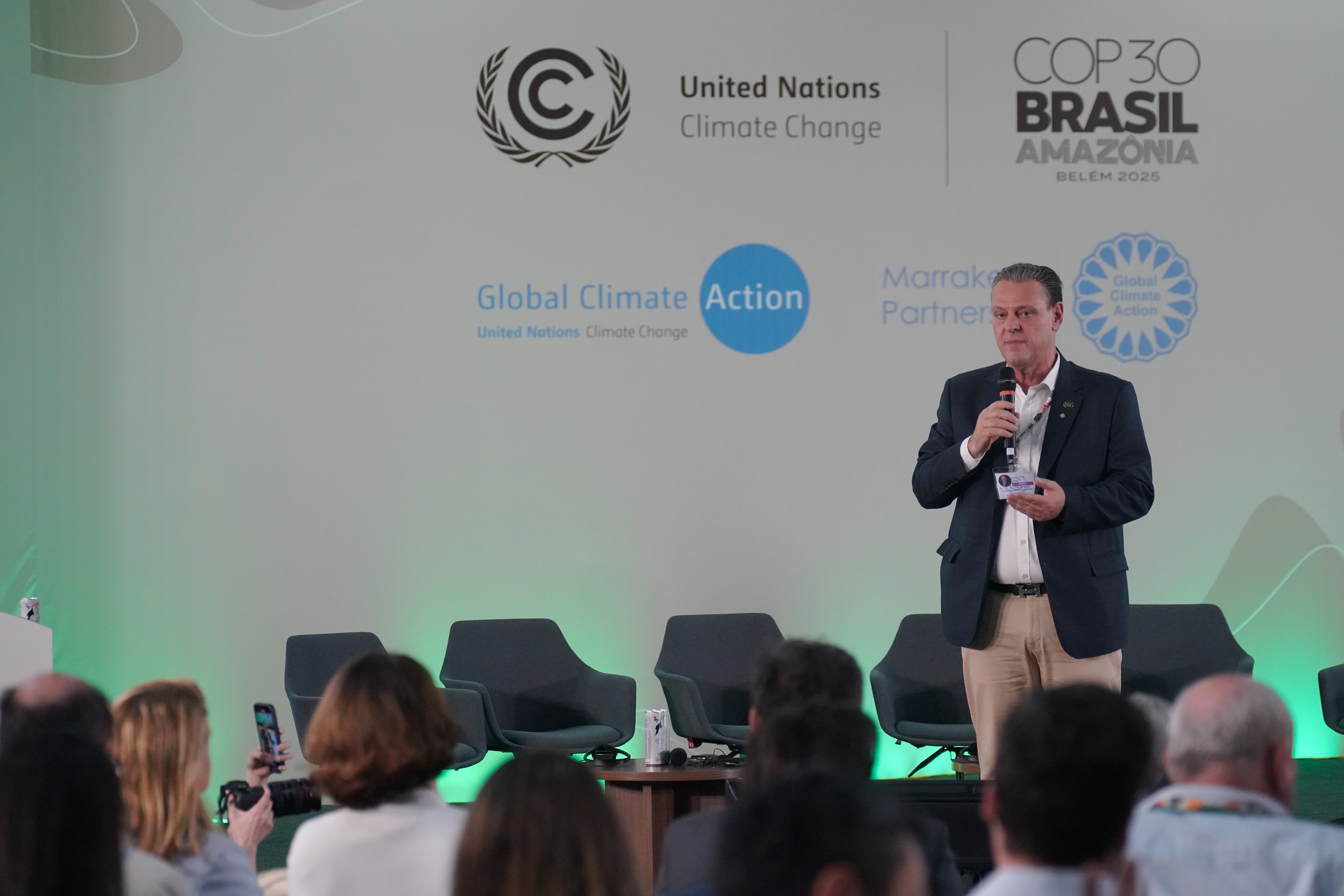Brazil launches initiative to restore degraded agricultural areas in different regions of the planet
The RAIZ Project is part of the global effort to accelerate investments in climate-resilient agriculture and land restoration. It will be implemented under the Activation Group for Key Objective 8 of the COP30 Action Agenda

By Rafaela Ferreira/COP30
The Resilient Agriculture Investment for Net-Zero Land Degradation (RAIZ, in its English acronym) was officially launched on Wednesday, 19 November, during COP30 in Belém, Pará. The initiative seeks to mobilize resources and support the sharing of technologies for the restoration of degraded agricultural areas in different regions of the world. RAIZ is part of a global effort to accelerate investments in climate-resilient agriculture and will be implemented under the Activation Group for Key Objective 8 of the conference’s Action Agenda.
Led by Brazil, the project has received support from nine countries, as announced at the high-level event: Australia, Canada, Germany, Japan, Saudi Arabia, New Zealand, Norway, Peru, and the United Kingdom. The initiative will assist participating countries in mobilizing and strategically allocating public and private investments aimed at large-scale restoration of degraded agricultural lands.
The Minister of Agriculture and Livestock (MAPA), Carlos Fávaro, recalled that RAIZ is based on lessons learned from Green Way and Eco Invest in Brazil, an innovative mechanism that mobilized approximately 6 billion dollars in public debt and commercial loans to restore up to 3 million hectares of pastureland. “These are 3 million hectares incorporated into the productive system and, without a doubt, this has allowed Brazil, in 2025, to harvest the largest crop in its history,” he said during the event.
“With the support of Embrapa (Brazilian Agricultural Research Corporation), at least 40 million hectares have already been identified in areas at some stage of degradation. These are areas that can be recovered with investments capable of improving soil fertility, increasing organic matter, providing fertilizers, and returning production to an excellent standard,” stated the Minister of Agriculture and Livestock.
The RAIZ initiative is coordinated by MAPA in partnership with the Food and Agriculture Organization of the United Nations (FAO), the Food and Land Use Coalition (FOLU), the Consultative Group on International Agricultural Research (CGIAR), the G20 Land Restoration Initiative, the World Bank, the Institute for Climate and Society (iCS), and Agroícone.
Degraded areas
According to a FAO study, more than 20 percent of the world’s agricultural land is currently degraded, equivalent to approximately 1 billion hectares. Degraded soils are less productive and less resilient, contributing to food insecurity and encouraging expansion into natural ecosystems, including deforestation. RAIZ responds to the growing global demand for food security and the preservation of productive ecosystems. United Nations estimates indicate that 2 billion hectares of land are degraded worldwide, directly affecting 3.2 billion people. FAO also reports that around 10 million hectares of forests are deforested each year, and data from Global Forest Watch (2024) show that the loss of primary tropical forests reached approximately 6.7 million hectares last year.
FOLU’s Executive Director, Morgan Gillespy, noted that restoring only 10 percent of degraded agricultural lands could recover 44 million tonnes of annual food production. “This could feed 154 million people and generate millions of rural jobs. This is not only an environmental agenda. It is an agenda for growth, food security, and jobs. It is an agenda for climate resilience.”
Gillespy also emphasized the importance of RAIZ’s financing model, which is not “just another fund” but an accelerator. “The proposal is very simple: to help governments and investors develop national public-private financing mechanisms that unlock investments for large-scale restoration. It is anchored in the COP30 Action Agenda and delivers a four-fold benefit for climate, biodiversity, food security, and land restoration,” said Morgan.
Pillars of RAIZ
The initiative proposes to offer four core services to countries. The first is the mapping of degraded landscapes to identify priority investment areas. The objective is to establish an interactive mapping tool able to meet the need for accurate analyses and ensure that financing is directed to areas with the highest productivity potential.
A second component is the identification of viable restoration solutions and the assessment of financing needs. Governments will receive support to assess scalable restoration solutions and develop a financing assessment for the restoration of agricultural lands, describing costs, returns, and financing gaps. Third, RAIZ will bring together interested investors to create or adapt co-investment vehicles that use public financing to reduce private investment risk and the cost of capital.
Lastly, the initiative will promote collaboration and knowledge exchange within the restoration ecosystem. The aim is to consolidate lessons learned from national experiences in case studies and guidance materials to support peer learning at the global level and improve enabling conditions for restoration financing.
According to the Special Envoy for Agriculture, Roberto Rodrigues, tropical agriculture and RAIZ can be replicated in other countries on the tropical belt. “Through these approaches, it will be possible to promote a just energy transition and generate employment, wealth, and income in these countries, with science and technology contributing to addressing climate change. We must protect what is most essential for the planet, which is universal peace. I am convinced that tropical agriculture demonstrates, including through RAIZ, that it is an instrument of peace and global unity,” concluded Roberto, who previously served as Brazil’s Minister of Agriculture.
